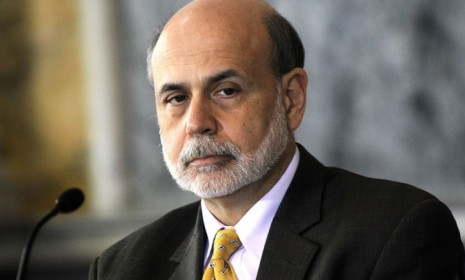Should the Fed try again to rescue the economy?
Officials at the central bank are sounding the alarm on the economy, suggesting that the Fed is preparing to take another shot at jumpstarting growth

A free daily email with the biggest news stories of the day – and the best features from TheWeek.com
You are now subscribed
Your newsletter sign-up was successful
This week, three influential Federal Reserve officials said the central bank should do more to stimulate the sluggish economy, which added a measly 80,000 jobs in June. John Williams, the president of the Federal Reserve Bank of San Francisco, went so far as to say the economy is moving at a "snail's pace," and may have even come to a shuddering halt. Williams' comments sparked speculation that the Fed would launch another round of quantitative easing, essentially printing money to buy up massive amounts of government bonds and other assets. The hope is that borrowing costs would then fall, businesses would spend more, and investors would buy more stocks. However, there are concerns that a new round of asset purchases, which would be the Fed's third since the 2008 financial crisis, could cause inflation to spike. Should the Fed get involved?
Yes. The Fed must be bold: The Fed's "actions have been too timid," allowing the jobless rate to remain at an unacceptable 8.2 percent, say Betsey Stevenson and Justin Wolfers at Bloomberg. "It's not hard to do better" — a fresh round of quantitative easing would certainly help boost the job market. And the inflation rate, inhibited by lackluster consumer demand, is safely below the Fed's informal benchmark of 2 percent, which means that the central bank has nothing to worry about on that front.
"Fed harms itself by missing goals"
The Week
Escape your echo chamber. Get the facts behind the news, plus analysis from multiple perspectives.

Sign up for The Week's Free Newsletters
From our morning news briefing to a weekly Good News Newsletter, get the best of The Week delivered directly to your inbox.
From our morning news briefing to a weekly Good News Newsletter, get the best of The Week delivered directly to your inbox.
No. There's little the Fed can do: The Fed has already purchased more than $2 trillion in Treasuries and other assets and the economy is still in the dumps, says Skyler Greene at Seeking Alpha. Low borrowing costs have failed to encourage consumers and businesses to borrow more, because they face a host of other fundamental economic concerns. And while markets tend to jump after actions by the Federal Reserve, that only masks deeper problems. More quantitative easing is the equivalent of an adrenaline shot — it could give the economy a boost, but it'll return to its "state of exhaustion when the adrenaline wears off."
"Why QE3 would be bad (and how to profit from it)"
It's time for Congress to step up to the plate: Private companies have actually "added jobs for 28 straight months," says Heather Boushey at MarketWatch. The public sector, however, has fared much worse. Over the past year, for instance, state and local governments have shed more than 100,000 teachers. And the construction industry is floundering. If our lawmakers would only act, these industries would be doing much better. It's time for Congress, and particularly the GOP-controlled House, to take action "that can get people back to work and lay the foundation for long-term growth."
"Conservatives in Congress stymie job gains"
A free daily email with the biggest news stories of the day – and the best features from TheWeek.com